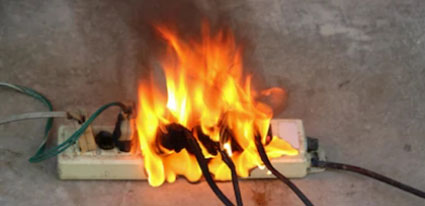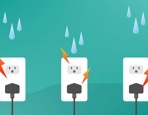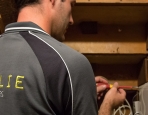Want to keep your family safe from electrical hazards?
Whether you have a home with children, own a commercial property, or run a business — ensuring the safety of everyone involved is absolutely vital.
An electrical safety hazard could result in potentially fatal accidents. This could lead to the loss or injury of a loved one, legal ramifications for your business, and even an investigation on the safety of your premise (and risk being shut-down).
Electricity is a fundamental aspect of our everyday lives. It powers our world and allows us to do our everyday tasks like cooking, watching TV, toasting bread, and so much more. However, there are some extremely dangerous electrical safety hazards that you must avoid at all costs.
Here are ten electrical safety hazards you need to be aware of:
#1. Exposed Electrical Components
Exposed electrical parts such as open power distribution units, temporary lighting, and damaged appliances can cause shocks and burns. Ensure you have a proper guarding system and warning signage around exposed electrical parts to avoid harm to unsuspecting individuals. This will allow for residents to be safe until a professional arrives to fix the problem.
#2. Wet Conditions Around Electricity
Water is one of the best conductors of electricity. Handling electrical appliances with wet hands can cause electrocution. Additionally, electric outlets in the kitchen or bathroom must be placed at an ample distance from the water source or pathways. This can be especially dangerous when there is water leaking into the home from burst pipes or damaged roofs.
In the case of fire caused by electricity, you should avoid using water at all costs. Instead, use a fire extinguisher.
#3. Exposed Sockets
Exposed sockets are especially dangerous when you have little children or animals in the building.
Electric sockets placed at the knee level or below must be covered with plastic closures that cannot be easily removed. Curious children are known to stick their fingers into sockets and causing fatal injuries.
#4. Overloading Power Outlets
Connecting multiple powerboards might seem like a good idea to get your electricals all working, but power outlets are designed to produce a specified amount of electricity. Some electrical fires are caused by plugging multiple high voltage devices into a single power strip.
Instead, try to spread your electrical appliances over multiple outlets.
#5. Incorrect Grounding
When electricity flowing through a circuit lacks a path to the ground, as a result of improper grounding, it must find an alternative path. The electricity finds an alternative path by jumping from a socket or switch to a finger and can cause electrocution.
#6. Defective Insulation
Insulation when defective or insufficient results in open live wires that may cause electric shocks. This danger is present even when open wires are ‘insulated’ using electrical tapes. If in doubt, speak to a professional immediately.
#7. Inspecting Electric Equipment While Powered On
When fixing or inspecting electrical equipment, ensure that all sources of electricity are turned off to avoid accidents. It is best to turn it off at the source (the outlet) as well, rather than just the appliance. Additionally, you should allow several minutes for the appliance to cool down from the electricity, especially for lightbulbs.
#8. Incorrect Wiring
Incorrect wiring is among the most common electrical hazards. It includes situations of insufficient electrical service to the home, inadequate overload protection, and poorly finished wiring connections. This can lead to electrical shock, dim or flickering lights, and high electricity bills.
#9. Overheating Items and Covered Wires
Placing upholstery, drapes, and other flammables in close proximity to lights and bulbs over a prolonged period is dangerous. This can lead to overheating and at times can lead to a fire.
Additionally, ensure that wires, extension cords, and adaptors are safely and openly kept. Avoid covering them with rugs or furniture as this could also cause overheating and electrical fires.
#10. Overloading Extension Cords
Extension cords are prone to misuse as a permanent substitute for additional sockets. Connecting two or three high voltage equipment to the same extension makes your building susceptible to electric fires. Instead, find another outlet to use.



